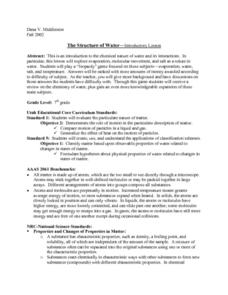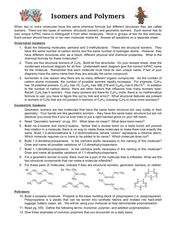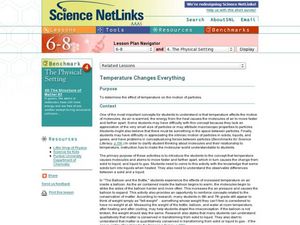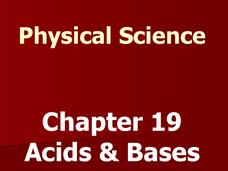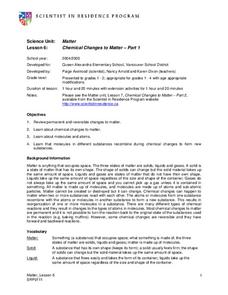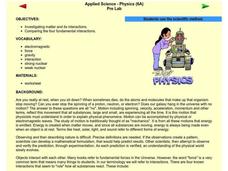Annenberg Foundation
Geometry 3D Shapes: Euler's Theorem
How do you get a theorem named after you? Euler knows what it takes! The third lesson of five asks pupils to use an interactive activity to compare the faces, vertices, and edges of seven different three-dimensional solids. They use...
Virginia Department of Education
Soap, Slime, and Creative Chromatography
Do you think chromatography paper suffers from separation anxiety? Young chemists make soap, slime, silly putty, and experiment with chromatography in this lesson. The material includes clear instructions for each experiment along with...
Center Science Education
The Nitrogen Cycle Game
Earth science experts learn about the roles of nitrogen by taking a virtual journey through the nitrogen cycle. Completing a passport worksheet along the way, they move from place to place around the classroom by the toss of dice. Each...
Curated OER
Succession in the Classroom
Students investigate their environment by growing plants in class. In this botany lesson, students discuss the lifespan of plants and animals and how they must be cared for continuously over time. Students grow a plant in...
Curated OER
Things That Glow
Third graders study the concept of light as an energy source. For this energy lesson students participate in a lab that show them the concept of light as an energy source.
Curated OER
The Chemical Nature of Water
Seventh graders simulate a Jeopardy game to examine the chemical nature of water. Among the topics featured are evaporation, water, salt, and temperature. finally, as review, 7th graders answer a battery of questions presented by the...
Curated OER
Organic Chemistry Reactions
In this organic chemistry reactions worksheet, learners are given a table with 8 different types of reactions that occur with organic molecules. Students answer 3 questions about the reactions given in the table and indicate which...
Curated OER
Isomers and Polymers
Young scholars create models of structural isomers, geometric isomers, and polymers. For this chemistry lesson, students are given definitions and molecular model kits to create a variety of different isomers and polymers.
Curated OER
Different Minerals
In this minerals worksheet, students read about the relationship between elements, rocks and minerals. They experiment using 6 different colored gumdrops to represent 6 common elements. Students construct gumdrop and toothpick models of...
Curated OER
Chemical Sleuthing
High schoolers engage in a lesson which includes flame tests and the construction of a simple diffraction spectrograph with which to measure sodium ion emissions. They use the Bragg equation to compute the wavelength of the line spectra...
Columbus City Schools
What’s Up with Matter?
Take a "conservative" approach to planning your next unit on mass and matter! What better way to answer "But where did the gas go?" than with a lab designed to promote good report writing, research skills, and detailed observation....
American Chemical Society
Why Does Water Dissolve Sugar?
Did you know that if you wait long enough, the M on the outside of an M and M will float to the surface when submerged in water? Learners observe the sugar coating of an M and M while it is dissolving in water. They explain how this...
Curated OER
Ozone Tag
Seventh graders explain the role of stratospheric ozone and predict at least three ways in which depleted ozone would change her/his lifestyle. They then describe the process by which chlorine or bromine compounds can break down ozone...
Curated OER
Nuclear Magnetic Resonance
Eleven slides are used in this PowerPoint to present how nuclear magnetic resonance works and to give learners an opportunity to interpret examples of nuclear magnetic resonance spectra. Ample information is provided, so this is a...
Curated OER
Temperature Changes Everything
Middle school chemists visit interactive websites in order to discover what happens to molecular motion when heat is added to matter. They conduct an experiment that demonstrates the expansion of matter with the addition of heat. A lab...
Mr. E. Science
Acids, Bases and Solutions
If you are not part of the solution, then you are part of the precipitate. The presentation covers solutions, suspensions, solubility, dissociation, and acid/base reactions. This is the 19th lesson in a series of 26.
Curated OER
Introduction to the Mole
Young scholars are introduced to the mole concept using a discovery-based method. Lesson includes activities with candy that allow students to discover the rules for mole-item, item-mole, mole-mass, and mass-mole conversions.
Curated OER
Matter
Students recognize that some changes to matter are reversible and some are not. In this matter instructional activity, students experiment a physical and chemical change. Students record experiment results in their science...
Curated OER
Polymers Lab: Bouncy Ball and Slime
Eighth graders investigate chemical reactions to produce polymers. In this polymers lesson plan, 8th graders experiment with sodium silicate and ethyl alcohol to make a polymer. They also experiment with borax and glue to make a polymer....
Curated OER
Applied Science - Physics Post-Lab
Students investigate energy. In this Physics lesson, students explore different sources of energy: heat, nuclear, and chemical. Students sing an electricity song.
Curated OER
Matter and Energy
Learners explore energy by completing a science worksheet in class. In this principles of matter lesson, students define the vocabulary terms force, gravity, nuclear, and electromagnetic before reading assigned text about energy....
Curated OER
Lightning
Students investigate lightning. In this lightning lesson, students demonstrate how static electricity is in the air by observing how a balloon reacts to a charge.
Curated OER
The Water Cycle and Global Warming
Students study the flow of water in the environment. For this water cycle lesson students evaluate the consequences of changes in the water cycle using data.
National Nanotechnology Infrastructure Network
Synthesis and Characterization of CdSe Quantum Dots
Does the size of a sample change the physical properties of that substance? It turns out it can! Young scientists combine physics and chemistry to synthesize CdSe quantum dots and record their color properties. Learners should...







